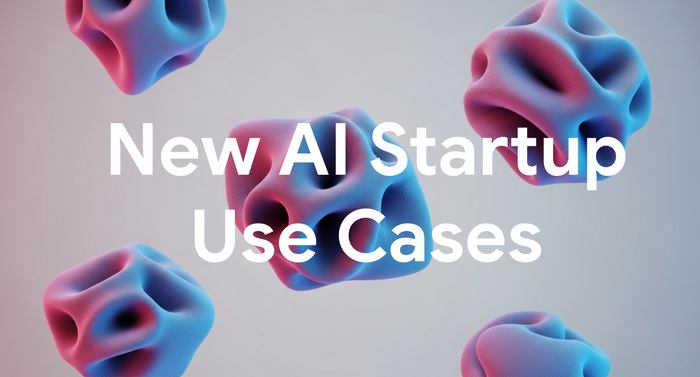Building an AI startup? 4 insights from 3 top AI startup founders
Darren Mowry
VP, Global Startups, Google Cloud
AI holds the promise of solving some of today's most complex business challenges. To make that promise a reality, a number of startups are working to transform AI technology into practical, production-ready business solutions. At this year's Google Cloud Startup Summit, we had an opportunity to assemble a panel of three AI startup founders, and each of them had insightful lessons to share about preparing, persevering, and finding success when you're building a business at the center of technology and business transformation.
Lessons learned: Key insights from AI startup founders
Our panel included Dave Rogenmoser, CEO of Jasper; Paroma Varma, co-founder of Snorkel AI; and Arvind Jain, CEO and co-founder of Glean. All three have been through the process of building a business, and each of them has the hard-earned wisdom to prove it.
It's already very clear that AI is delivering on its potential as a catalyst for business disruption on an accelerated scale. The conversation with these three AI business pioneers kept coming back to one overarching question: What does it take to launch a startup that can survive and grow in such a fast-evolving environment? By the time we wrapped up the conversation, our group of AI startup founders had touched on four key insights.
1. Stay grounded by staying close to your customers
Even by the standards of modern IT innovation, AI technology is evolving at a rapid pace. Two of the startup founders in our conversation stressed the importance of focusing an AI startup on its ability to solve customers' problems — not on chasing the latest language models or algorithms. At Snorkel AI, for example, Varma pointed to the company's focus on AI data sets as an example of how to succeed by tailoring AI solutions to a customer's specific needs. "In the long run, we're excited to stay nimble, stay close to customers, keep focusing on the real value," she said. "Technology will continue evolving, but we believe it's the data that will really differentiate companies and use cases from each other, and continue to be that key to AI development."
Rogenmoser also stressed Jasper's customer-centric approach as a key differentiator. "By far the safest place to be is right next to the customer, engaging with them and talking with them," he said. "A lot of the conversation [focuses on] the technical aspects: what's the latest model, what can it do? But I really see very few people talking to customers and getting close to them. I think that's an opportunity."
2. Position AI as your enabling technology, not as your product
Jain of Glean reminded the audience that the pace of AI change and evolution is a double-edged sword: While it continues to blaze a path toward remarkable new capabilities, that same pace of evolution makes it virtually impossible to position AI as a defined product for a specific target audience.
Jain's point reinforced the value of customer-centric thinking for AI startups: Treat AI as a problem-solving tool, not as a product unto itself. "Think about the product that you're building as an end-to-end problem," Jain advised. "Work with your customers. Think about the workflows that are going to actually help them with the task that they need to do, and think of AI just as an enabler. . . not as the entire product."
Varma touched on the same point in terms of where and how AI technology creates value for Snorkel AI and its customers. "Especially now, it's really easy to get distracted by a lot of the shiny things that are going on," she stated. "That [bleeding-edge technology] might get you 60% to 80% of the way, but it won't get you to the point of delivering business value."
"That last mile might not always be the most fun or the most innovative part, but it determines whether a model actually ships."
3. Perfect the art of self-disruption
Rogenmoser recounted how his background in marketing and in copywriting drove him to embrace AI precisely because it was so clearly on a path to disrupting his profession — forcing him to adapt and evolve to seize a new opportunity.
For startups working with AI-driven solutions, Rogenmoser said the ability to practice self-disruption — in other words, pivoting in sometimes radically different directions to pursue unexpected opportunities and adapt to game-changing new technology is a critical advantage. "Jasper's probably going to . . . we're going to need to disrupt ourselves several more times in the next two years even, which is ridiculous," he said. "Companies used to do that, maybe once or twice over a 50-year period, and now we have to do it maybe every year. But we want to be customer-led and we want to just let them pull us into . . . new use cases.”
4. Remember to enjoy the journey, have fun, and be amazed
Starting and growing an AI startup is a big job that's full of challenges, and it's definitely one with no guarantees of long-term success. For all three of these entrepreneurs, building a business around AI technology is a labor of love that gives them a front-row view of history in the making.
"It's important to enjoy the process," Rogenmoser said. "We've always just had a lot of fun building and we've tried to do things that are enjoyable, knowing that if I just keep coming back every day for a long enough period of time, it's going to probably work out."
Jain supported this sentiment with a reminder of just how remarkable it has been to watch AI emerge as such a dynamic and transformative force. "It's really hard to comprehend what's going to change and the pace at which things will be moving in five years," he said. "Right now, it's difficult to predict where we'll be with AI even next year. All we know is that we need to stay agile and stay ready to leverage what's coming, because it's going to be remarkable."
Catch the full conversation: Register for the Google Cloud Startup Summit to watch "Founder Advice: What it takes to build a disruptive AI startup" on demand for even more wisdom from this trio of founders.



